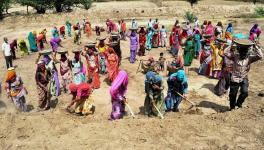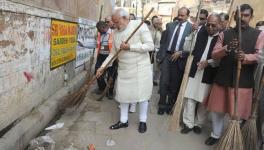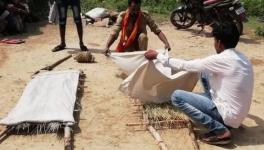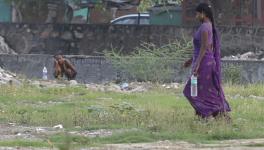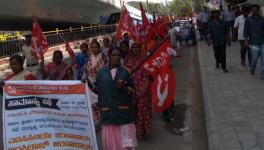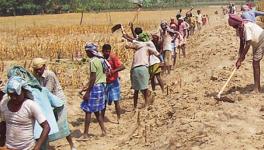Rajasthan: Blame Game Continues as Dabli Rathan Struggles to Manage its Filth
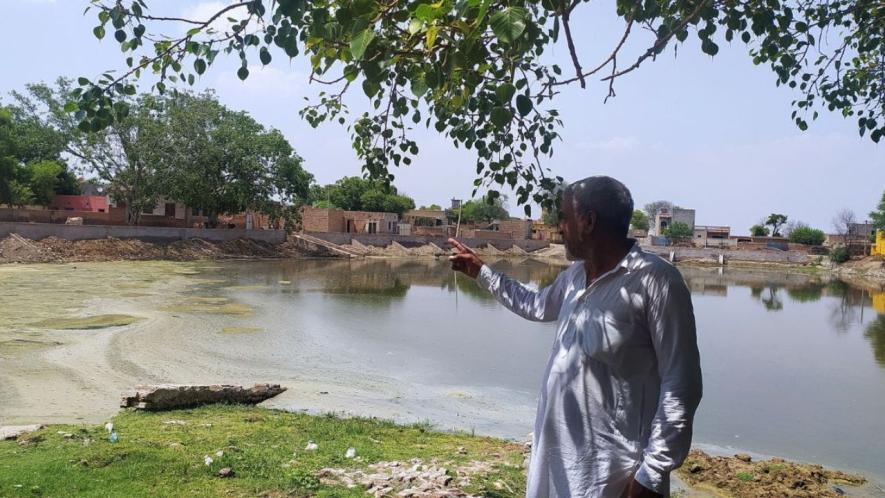
A pond filled with dirty water (Photo - Amarpal Singh Verma, 101Reporters)
Hanumangarh, Rajasthan: Among the largest villages in Hanumangarh district of Rajasthan, Dabli Rathan comprises two village panchayats — Dabli Bas Molvi and Dabli Bas Kutub. The panchayat office of Dabli Bas Molvi is quite big and beautiful. At its entrance is the 'I Love Dabli Rathan' selfie point.
“Outside the panchayat office, you can take a beautiful selfie. However, your illusion will be shattered as you move in a little further. It is difficult to put up with the stench of filth in the streets,” says villager Rajendra Gumber (71).
As one moves forward, there is garbage all around. Drains are clogged and water spills onto roads. Village ponds are also filthy, covered with a thick layer of water hyacinths. The condition of Dabli Bas Kutub is no different.
“I have repeatedly informed the panchayat about the dirty pond and filthy streets, but there is no solution,” says Suresh Rajput (44), a resident of Dabli Bas Molvi ward 14.
Pointing to a pond in ward 14, Omprakash Verma (45) says it has not been excavated for almost a decade. “The panchayat tries to pump dirty water from it and sends it elsewhere,” he adds.
In contrast, the sarpanch and village development officers claim that they try their best despite the limited resources. They also blame the villagers for not being bothered about cleanliness. Sarpanch Jagtar Singh Brar of Dabli Bas Kutub says that villagers make cow dung cakes and put them in the streets to dry, besides using the dry pond for storing wood and cow dung cakes.
According to the data available on e-GramSwaraj portal, Dabli Bas Molvi received a tied fund of Rs 74,03,150 and an untied fund of Rs 50,01,103 from the government this year. Of this, Rs 37,17,075 was meant for cleanliness. Similarly, this year, Dabli Bas Kutub received Rs 20,07,010 as tied fund and Rs 15,78,000 as untied fund, of which Rs 12,04,206 was for cleanliness.
"However, 60% of the tied funds is meant for water sanitation, and that too is reserved for capital investment such as sheds, machines, etc. So, to make payments, local bodies have to raise funds on their own. At the same time, measures like taxation are not mostly pursued by local bodies due to various socio-political reasons. This is also why local bodies want everything to come from the government," Dr R Ramesh, head and associate professor, Centre for Rural Infrastructure, National Institute of Rural Development and Panchayati Raj, Hyderabad, tells 101Reporters.
The Swachh Bharat Mission (Grameen) aims at improving the general standards of living of villagers, accelerate sanitation coverage, promote sustainable sanitation facilities through awareness generation and health education to communities and panchayati raj institutions, and develop affordable and appropriate technologies for ecologically safe and sustainable sanitation. While being run with various objectives like promoting sanitation and developing community-managed environmental sanitation systems with a special focus on solid and liquid waste management for overall sanitation in rural areas, none of these objectives appear to have been fulfilled here.
However, Satnam Singh and Iqbal Singh, the village development officers of Dabli Bas Molvi and Dabli Bas Kutub, respectively, consider the funds insufficient. Both claim that all the objectives of SBM(G) cannot be achieved with such small allocation. “People compare villages with cities in terms of cleanliness and hygiene, but compared to municipalities, panchayats neither have adequate budget nor resources.”
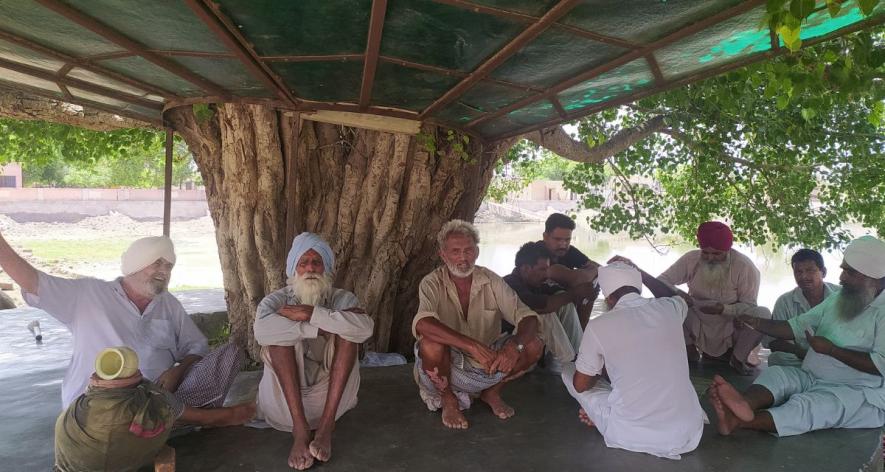
Villagers telling about the condition of cleanliness in Dabli Rathan (Photo - Amarpal Singh Verma, 101Reporters).
The estimated population of Dabli Bas Molvi is 12,000 and Dabli Bas Kutub is 5,000. In both villages, panchayats have not established a functioning waste management system under the SBM(G). There is no compliance with government guidelines under SBM. No work is being done under the components of sanitation management in both the panchayats. Forget about sorting and recycling of waste from the village, even garbage is not collected.
However, Satnam and Iqbal claim that by spending the money received for cleanliness, they have constructed individual family toilets, community sanitary complex toilets, etc. Sewer lines have also been constructed. There is a proposal to start solid and liquid waste management.
“The work of waste management in the village is dependent on animals and those who buy scrap. We feed organic waste such as vegetable peels, leftover food and agricultural waste to livestock. Inorganic and solid waste such as paper, various metals, plastic, glass and cardboard are sold to scrap dealers. The things that are unusable remain here and there, along with the garbage in the village streets,” say Bohad Singh, Gurvinder Singh, Laxman Singh, Ishwar Singh and Hardev Singh, all from Dabli Bas Kutub.
However, Satnam maintains that they try to get the cleaning done by deputing four to five labourers. Sarpanch Brar also claims that from time to time, they employ MGNREGA labourers for this work. “We get less budget under cleanliness, so we include cleanliness work like maintenance of ponds under MGNREGA and use those funds."
However, MGNREGA funds cannot be used for every day cleaning work.
However, villager Yahiya Khan alleges that cleaning is not done even once in a month. Due to lack of cleanliness, drains overflow and dirty water spreads on the roads.
Both the panchayats have proposed to set up sanitation resource centres in their respective jurisdictions, under which e-rickshaws would collect garbage from every household and take it to the centre where organic and inorganic wastes are separated. As cow dung dirties the entire village, there is also a plan to set up a biogas plant, from which gas can be delivered to the homes of the villagers by laying pipes. Organic fertiliser can also be made from cow dung and sold. The income thus generated can be spent on village development works. When asked about this, sarpanch Brar says that the government has asked to do a lot of work, but no budget provision has been made for it.
SBM(G) district coordinator Sunita Rathod tells 101Reporters that extensive work is being done to make villages completely clean. “Initially, it was decided to open resource centres in 39 of the total 268 panchayats in the district. Tenders were invited three months ago for door-to-door garbage collection, but the contractors refused to take up the work citing low basic schedule of rates (BSR) approved by the state government. Subsequently, the tenders were cancelled,” she says, adding that tenders have been invited again.

A villager showing a pond full of water hyacinth (Photo - Amarpal Singh Verma, 101Reporters)
Asked about the allocation, Rathod says funds can be arranged under SBM, 15th Finance Commission, MGNREGA and from MP-MLA funds. Besides finding donors, a small contribution can be taken from the villagers as well. “The state government has given instructions to spend 60% of the budget on cleanliness in every panchayat. Construction of individual toilets, community toilets, soak pits and drains, cleaning of drains, cleaning of streets and localities are being done using these funds. Annual audit is conducted in every village panchayat.”
She adds that various activities such as rallies, quiz competitions, slogan writing and training in making useful items from unused plastic were conducted to create awareness about cleanliness in the villages.
Pilibanga Panchayat Samiti's Additional Development Officer Hukam Singh tells 101Reporters that in Kalibangan, Dabli Bas Kutub and Dabli Bas Molvi panchayats, garbage collection from houses and commercial establishments, its separation, road and drain cleaning work of villages and cleaning work of community sanitation complexes will be done. Tenders have been invited in this regard.
He says there has been no change in the BSR of tenders, but the successful tenderer can employ experienced people in cleaning work and streamline work by installing GPS in vehicles after the online tracking system/portal is implemented. Various conditions have been imposed in the payment of wages like following the Minimum Wages Act, paying double the rate if a worker works for more than eight hours, resolving complaints related to cleanliness within 24 hours.
Dr Ramesh says no village can be completely clean unless the people there and the panchayat work together. “While the panchayat spends money for cleanliness, Rs 25 per person should be taken from the villagers for this work. This is necessary to create a sense of participation among them. The funds received from the government for cleanliness should also be used properly, transparently and honestly,” he says.
Amarpal Singh Verma is a Rajasthan-based freelance journalist and a member of 101Reporters, a pan-India network of grassroots reporters.
Get the latest reports & analysis with people's perspective on Protests, movements & deep analytical videos, discussions of the current affairs in your Telegram app. Subscribe to NewsClick's Telegram channel & get Real-Time updates on stories, as they get published on our website.











